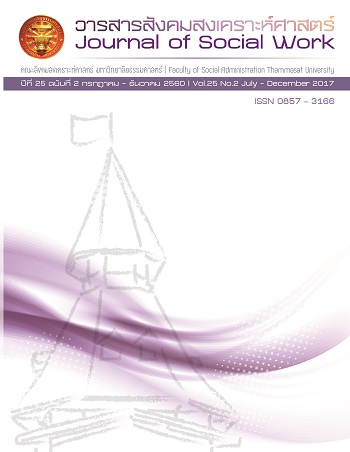An Analysis of the Results and Impacts of a Publicly Approved Health Policy under a Strategic Plan of the National Health Commission Office, Thailand
Keywords:
result and impact, participatory health policy, strategic planAbstract
The objective of this study was to analyze the results and impacts of a participatory health policy–a government policy of getting the government, local authority and local people to work together to implement public health resolutions put forward by the local people–under a strategic plan of the National Health Commission Office of Thailand. This study was a qualitative study that synthesized conclusions based on data collected from documents, in-depth interview and small group discussion. After the analysis, the following 10 conclusions and 3 suggestions were drawn: A. conclusions: (1) political public spheres have been opened up for every sector to participate in pushing public health resolutions into motion; (2) a public policy process mechanism has been created in tandem with other policy mechanisms; (3) several new public health issues have been raised and become widely known; (4) mechanisms for collaboration between local people and local authorities have been established; (5) successful collaborative drives of public resolutions from this policy can be good models for other government agencies to use; (6) markedly heightened public awareness has been achieved; (7) integrated efforts across various government agencies, directly or indirectly related to public health issues, have resulted during drives of public health resolutions; (8) the National Health Commission has been successful in implementing its plan: empowering local communities to put forward their public health resolutions; (9) the initial success of the commission enabled delegation of some of its previous tasks to strong communities; and (10) the context of policy implementation in urban areas was very different from the context in rural areas; B. suggestions: (2) Utmost importance should be placed on local authorities because they are in the closest contact with local people and so can help the people overcome their operation weaknesses; and (3) The government should continue to develop and widen its implementation of this policy to cover all provinces as well as strengthen the policy processes and mechanisms that are already in place, but should not neglect the public resolutions that have already been made.
References
Porntida, V. and others. Performance Evaluation of the National Health Commission Office for the Fiscal Year 2013. Nakhon Pathom: Mahidol University; 2014 (in Thai)
Porntida, V. and others. Performance Evaluation of the National Health Commission Office for the Fiscal Year 2014. Nakhon Pathom: Mahidol University; 2015 (in Thai)
The National Health Commission Office. Manual of Satisfaction Survey for the Year 2014. Nonthaburi: The National Health Commission Office; 2014 (in Thai)
The National Health Commission Office. Annual Report 2014: Synergy Report 7. Nonthaburi: The National Health Commission Office; 2015 (in Thai)
Downloads
Published
How to Cite
Issue
Section
License
The manuscripts published in the Social Work Journal is the copyright of the Social Work Journal, Thammasat University
Any article or opinion appeared in the Social Work Journal will solely be under the responsibility of the author The Faculty of Social Administration, Thammasat University and the editors do not need to reach in agreement or hold any responsibility.



